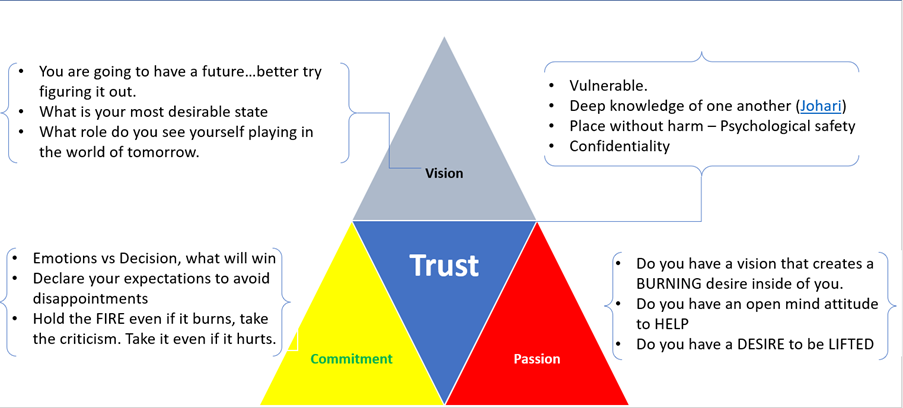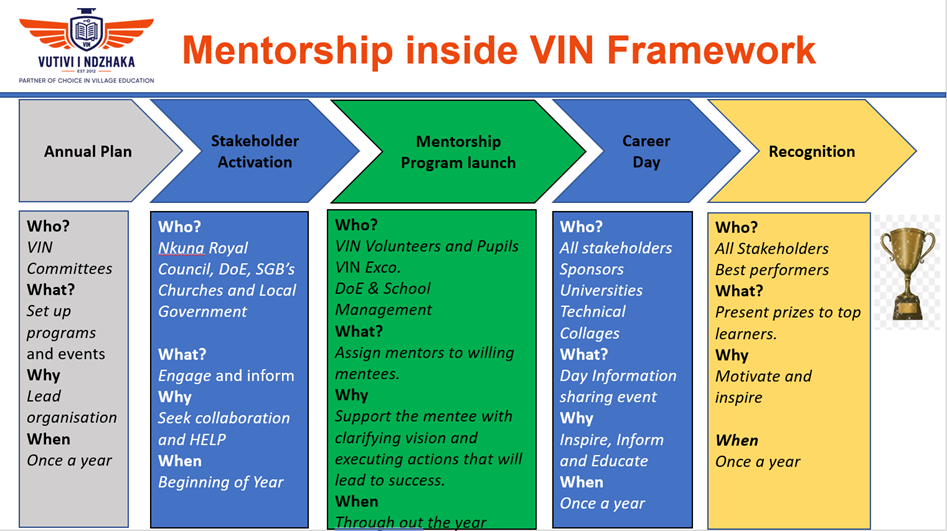Mentorship Program
What is mentoring?
Mentoring is a way for a more experienced individual to help a learner grow and develop in their career. This type of relationship can be formal or informal. In informal mentoring, the learner sets goals, but these goals are not always clear and the relationship is not structured. With formal mentoring, both parties agree on specific goals and requirements.
It serves to enhance social capital, contribute to cultural progression, and align with moral values. Ideally, a mentor is someone from the local community who comprehends prevailing circumstances and has connections with the mentee or those close to them.
Why is Mentoring important?
Mentoring holds significance as it enables the mentee to enhance their academic effectiveness, acquire new skills, build confidence, and make informed decisions for overall career growth.
The purpose of mentoring is to provide a relatable figure who can offer clarity on areas that the mentee is yet to understand. It serves to enhance social capital, contribute to cultural progression, and align with moral values. Ideally, a mentor is someone from the local community who comprehends prevailing circumstances and has connections with the mentee or those close to them.
Becoming a Mentor:
Becoming a mentor involves leveraging one's knowledge, experience, encouragement, and skills to provide guidance, advice, and limited hands-on training to a developing leader. While a mentor can play a crucial role in directing a mentee toward their potential, it's essential to recognize the boundaries. A mentor should not and cannot force changes upon the mentee against their will. The mentorship relationship thrives on mutual respect and a collaborative approach, allowing the mentee to actively engage and embrace their growth journey.
Mentor-Mentee Relationship TRIAD

Building a mentoring relationship is a joint effort. Vutivi I Ndzhaka Mentorship operates on the basis of desire (vision), requiring passionate commitment from both mentors and mentees.
Key Pillars of Mentorship:
Invest Time In Knowing the Mentee
- Schedule regular calls.
- Plan in-person meetings.
- Utilize multiple platforms for communication,
with a cautious approach to social media.
Keep Records
- Show care and empathy by noting sensitive family events.
- Monitor academic progress, including Grade 11 and test results.
- Assist with and track tertiary applications.
Create a Network
- Establish a connection with someone in the mentee's home.
- Monitor academic progress, including Grade 11 and test results.
- Encourage mentees to build a support network.
Becoming a Mentor?
Identify Motivation:
- Understand why you want to be a mentor and what motivates you to take on this role.
Assess Contributions:
- Analyze what you can offer to your mentee in terms of influence, skills, knowledge, and other contributions.
Clarify Expectations:
- Identify your needs, expectations, and limits for the mentor-mentee relationship, setting clear boundaries.
Mentees Responsibilities?
- take full advantage of opportunities provided by the mentor(s).
- keep the mentor(s) informed of academic progress, successes, challenges, and other concerns.
- exchange ideas and experiences with the mentor(s).
- seek assistance and support.
- Give mentor(s) feedback. .
Mentor & Mentee Together Should:
Identify Mentor Roles:
- Clearly define the roles the mentor can play in helping the mentee achieve their goals.
Communicate Regularly:
- Maintain regular communication to foster a strong and effective mentor-mentee relationship.
Cancel Only When Necessary:
- Cancel meetings only when absolutely necessary, respecting the value of scheduled interactions.

Roles and Responsibilities in Mentorship:
The Mentor Should:
- 1. Provide Guidance Based on Experience
- Offer advice derived from past experiences, ensuring it directly addresses the mentee's concerns.
- 2. Create a Positive Relationship
- Establish a positive atmosphere for open communication, avoiding any perception of incompetence in the mentee.
- 3. Avoid 'Checking Up' on the Mentee
- Agree on communication schedules and allow the mentee to initiate contact at agreed-upon times.
- 4. Help Identify and Solve Problems
- Assist the mentee in identifying issues and guide them toward finding solutions, fostering empowerment.
- 5. Lead Through Problem-Solving
- Empower the mentees by guiding them through problem-solving processes instead of providing direct solutions.
- 6. Offer Constructive Criticism
- Provide constructive criticism in a supportive manner, helping the mentee learn and improve.
- 7. Share Thought Processes
- Share your own thought processes with the mentee to provide insights into decision-making.
- 8. Assign "Homework" if Applicable
- Encourage improvement by assigning relevant tasks if the mentee expresses interest.
- 9. Refer to Others When Necessary
- Direct the mentee to others who can offer more effective guidance on specific aspects of the job.
- 10. Solicit Feedback
- Seek feedback from the mentee to enhance your own skills and foster a mutually beneficial relationship.
- 11. Be Prepared for Contact
- Anticipate questions or issues before interactions with the mentee to ensure effective support.
- 12. Keep Eyes Open for Helpful Resources:
- Look for articles and websites relevant to discussions, demonstrating ongoing interest in the mentee's success.
- 13. Avoid Doing the Mentee's Job
- Resist the temptation to step in and do the mentee's job for them, allowing them to learn and grow independently.
Do's and Don'ts for Mentors:
Do:
- 1. Be Clear About Motives - Clearly articulate your motives for helping your mentee to avoid mixed messages.
- 2. Consider Both Needs - Balance meeting your mentee's needs with considering your own expectations from the relationship.
- 3. Prepare for the Relationship's End - Acknowledge that successful mentorship involves the mentee eventually moving on, and the relationship evolving or concluding.
Don't:
- 1. Give Up Quickly - Persist if the mentee initially resists help, as they may not immediately recognize the value offered.
- 2. Force a Path - Avoid attempting to force the mentee to follow your path; respect their unique journey and progress along that path.
- 3. Preconceived Outcome - Keep an open mind and avoid having a preconceived plan for the final outcome of the mentor-mentee relationship.
Getting involved ?
Together, we can make a difference in the village by getting involved in the Vutivi I Nzhaka initiative and improving the village education. Are you ready to make a difference? Become a mentor, a mentee, or contribute to village education. Your actions have the power to inspire change and transform lives.
Get involved